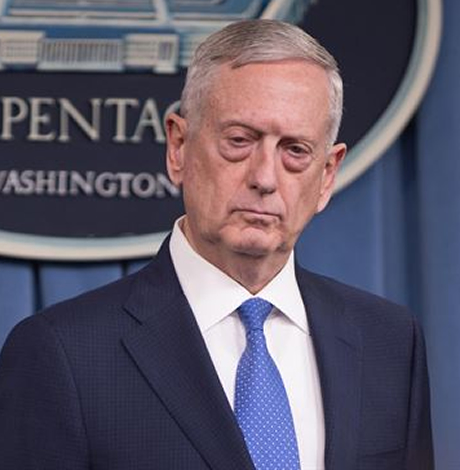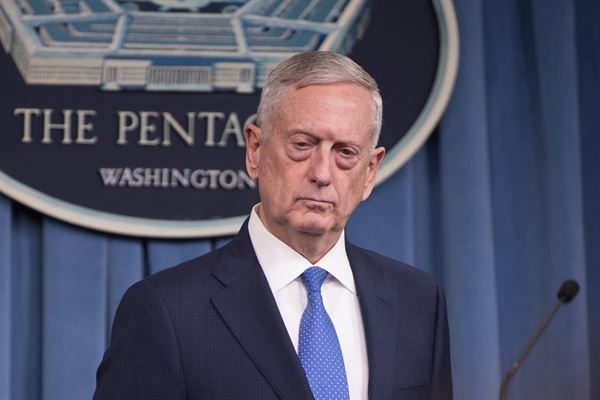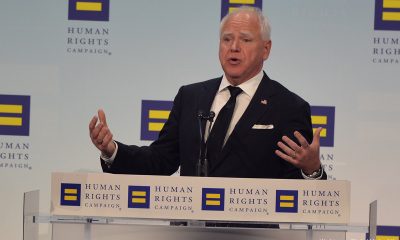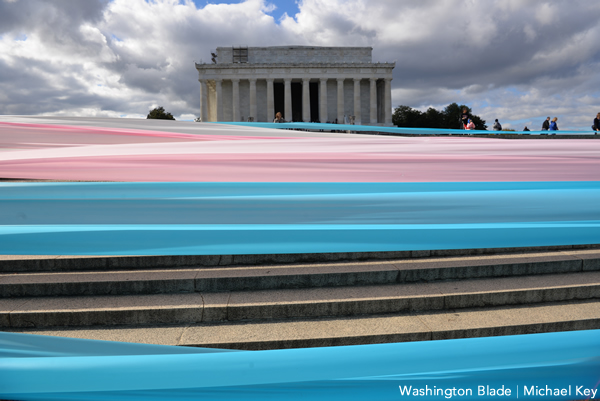National
Pentagon to allow trans enlistments Jan. 1 after latest court order
Judge denies DOJ’s request for a temporary stay on accessions


The Pentagon under Defense Secretary Jim Mattis will allow transgender service members to enlist starting Jan. 1. (Photo courtesy Department of Defense)
The Pentagon has affirmed it will allow transgender enlistments starting Jan. 1 on the same day a federal judge asserted her order against President Trump’s ban on their service means they can accede into the military on that target date.
U.S. District Judge Colleen Kollar-Kotelly, a Clinton appointee, issued the order Monday in response to a request from the U.S. Justice Department for a temporary stay on the portion of her order requiring the Pentagon to admit transgender service members starting Jan. 1.
“For more than a year preceding the summer of 2017, it was the policy and intention of the military that transgender individuals would soon begin to accede,” Kollar-Kotelly said. “Moreover, the court issued the preliminary injunction in this case approximately six weeks ago, and since then defendants have been on notice that they would be required to implement the previously established policy of beginning to accept transgender individuals on January 1, 2018. In other words, with only a brief hiatus, defendants have had the opportunity to prepare for the accession of transgender individuals into the military for nearly one and a half years.”
Kollar-Kotelly also takes a jab at the Justice Department over the process in which it requested a stay, saying the “portrayal of their situation as an emergency is belied by their litigation tactics.” She notes the appeal of her initial decision didn’t come until weeks later and the request for a partial stay didn’t come until December.
“If complying with the military’s previously established January 1, 2018 deadline to begin accession was as unmanageable as defendants now suggest, one would have expected defendants to act with more alacrity,” Kollar-Kotelly writes.
The judge had already clarified in response to a request from the U.S. government that her order against Trump’s transgender military ban, issued in response to a lawsuit filed by GLBTQ Advocates & Defenders and the National Center for Lesbian Rights, means transgender enlistments must begin Jan. 1.
That was the target date Defense Secretary James Mattis established for transgender enlistment in a memo he issued in June delaying that change in policy for another six months in response to a joint request from military service chiefs. Transgender enlistments were initially scheduled to begin June 30 as a result of a change initiated in the Obama era under former Defense Secretary Ashton Carter.
Shannon Minter, legal director for the National Center for Lesbian Rights, said in a statement the Trump administration’s assertion “our highly sophisticated military is unprepared to implement a minor policy change after more than a year of preparation are simply not credible.”
“The military has studied this issue extensively and determined that permitting qualified transgender people to enlist and serve will only strengthen our nation’s armed forces,” Minter writes. “This administration’s claim that allowing transgender people to enlist will lessen military preparedness is contradicted by the military’s own conclusions.”
The Justice Department has already appealed Kollar-Kotelly’s decision against Trump’s transgender ban as well as her clarification it means transgender enlistments must begin Jan. 1 to the U.S. Federal Circuit Court of Appeals in D.C. Meanwhile, the Justice Department has also appealed an order against the transgender ban issued by a federal judge in Maryland as a result of a separate lawsuit filed by the American Civil Liberties Union to the U.S. Third Circuit Court of Appeals.
Lauren Ehrsam, a Justice Department spokesperson, is quoted in the Washington Post as saying the department disagrees with the ruling and is “currently evaluating the next steps.”
“Plaintiffs’ lawsuit challenging military service requirements is premature for many reasons, including that the Defense Department is actively reviewing such service requirements, as the president ordered, and because none of the plaintiffs have established they they will be impacted by current policies on military service,” Ehrsam reportedly added.
Prior to the ruling, as reported by the Associated Press, the Pentagon announced Monday it’s preparing to admit transgender people into the armed forces starting Jan. 1 despite the Justice Department’s continued efforts to fight the court orders.
Maj. David Eastburn, a Pentagon spokesperson, told the Washington Blade the U.S. military “will begin processing transgender applicants for military service on January 1, 2018” as legal opportunities to challenging the court orders are evaluated.
Eastburn said the Pentagon will still disqualify potential recruits with “gender dysphoria, a history of medical treatments associated with gender transition and those who underwent reconstruction.”
However, those recruits, Eastburn said, will be allowed into the military if a medical provider certifies they’ve been clinically stable in their gender identity for 18 months and “are free of significant distress or impairment in social, occupational or other important areas.”
White House Press Secretary Sarah Huckabee Sanders, questioned on the Pentagon announcement by NBC News during the daily briefing, said the change reflects the requirements of court orders against Trump’s transgender military ban.
“As of right now, they’re simply complying with a court order and preparing to implement a previous policy to remain in compliance,” Sanders said.
Sanders added, however, the Justice Department is “currently reviewing the legal options to ensure that the president’s directive can be implemented,” deferring additional questions to the department.
Matt Thorn, executive director of OutServe-SLDN, said his organization is “very pleased” the Pentagon is preparing to admit transgender enlistments on Jan. 1 as required by court order.
“The lawsuits filed by all organizations and the injunction by Judge Koller-Kotley should definitively be a sign to this administration that discrimination will not be tolerated in our armed forces,” Thorn added. “The Pentagon never wanted this ban, it was moving ahead with this policy until Trump irrationally tweeted his bigotry about trans service members. We are eager to get back on track with the policy and with the Department of Defense complying with this court order we hope to do that.”

The Comings & Goings column is about sharing the professional successes of our community. We want to recognize those landing new jobs, new clients for their business, joining boards of organizations and other achievements. Please share your successes with us at [email protected].
Congratulations to Gil Pontes III on his recent appointment to the Financial Advisory Board for the City of Wilton Manors, Fla. Upon being appointed he said, “I’m honored to join the Financial Advisory Board for the City of Wilton Manors at such an important moment for our community. In my role as Executive Director of the NextGen Chamber of Commerce, I spend much of my time focused on economic growth, fiscal sustainability, and the long-term competitiveness of emerging business leaders. I look forward to bringing that perspective to Wilton Manors — helping ensure responsible stewardship of public resources while supporting a vibrant, inclusive local economy.”
Pontes is a nonprofit executive with years of development, operations, budget, management, and strategic planning experience in 501(c)(3), 501(c)(4), and political organizations. Pontes is currently executive director of NextGen, Chamber of Commerce. NextGen Chamber’s mission is to “empower emerging business leaders by generating insights, encouraging engagement, and nurturing leadership development to shape the future economy.” Prior to that he served as managing director of The Nora Project, and director of development also at The Nora Project. He has held a number of other positions including Major Gifts Officer, Thundermist Health Center, and has worked in both real estate and banking including as Business Solutions Adviser, Ironwood Financial. For three years he was a Selectman, Town of Berkley, Mass. In that role, he managed HR and general governance for town government. There were 200+ staff and 6,500 constituents. He balanced a $20,000,000 budget annually, established an Economic Development Committee, and hired the first town administrator.
Pontes earned his bachelor’s degree in political science from the University of Massachusetts, Dartmouth.
Kansas
ACLU sues Kansas over law invalidating trans residents’ IDs
A new Kansas bill requires transgender residents to have their driver’s licenses reflect their sex assigned at birth, invalidating current licenses.

Transgender people across Kansas received letters in the mail on Wednesday demanding the immediate surrender of their driver’s licenses following passage of one of the harshest transgender bathroom bans in the nation. Now the American Civil Liberties Union is filing a lawsuit to block the ban and protect transgender residents from what advocates describe as “sweeping” and “punitive” consequences.
Independent journalist Erin Reed broke the story Wednesday after lawmakers approved House Substitute for Senate Bill 244. In her reporting, Reed included a photo of the letter sent to transgender Kansans, requiring them to obtain a driver’s license that reflects their sex assigned at birth rather than the gender with which they identify.
According to the reporting, transgender Kansans must surrender their driver’s licenses and that their current credentials — regardless of expiration date — will be considered invalid upon the law’s publication. The move effectively nullifies previously issued identification documents, creating immediate uncertainty for those impacted.
House Substitute for Senate Bill 244 also stipulates that any transgender person caught driving without a valid license could face a class B misdemeanor, punishable by up to six months in jail and a $1,000 fine. That potential penalty adds a criminal dimension to what began as an administrative action. It also compounds the legal risks for transgender Kansans, as the state already requires county jails to house inmates according to sex assigned at birth — a policy that advocates say can place transgender detainees at heightened risk.
Beyond identification issues, SB 244 not only bans transgender people from using restrooms that match their gender identity in government buildings — including libraries, courthouses, state parks, hospitals, and interstate rest stops — with the possibility for criminal penalties, but also allows for what critics have described as a “bathroom bounty hunter” provision. The measure permits anyone who encounters a transgender person in a restroom — including potentially in private businesses — to sue them for large sums of money, dramatically expanding the scope of enforcement beyond government authorities.
The lawsuit challenging SB 244 was filed today in the District Court of Douglas County on behalf of anonymous plaintiffs Daniel Doe and Matthew Moe by the American Civil Liberties Union, the ACLU of Kansas, and Ballard Spahr LLP. The complaint argues that SB 244 violates the Kansas Constitution’s protections for personal autonomy, privacy, equality under the law, due process, and freedom of speech.
Additionally, the American Civil Liberties Union filed a temporary restraining order on behalf of the anonymous plaintiffs, arguing that the order — followed by a temporary injunction — is necessary to prevent the “irreparable harm” that would result from SB 244.
State Rep. Abi Boatman, a Wichita Democrat and the only transgender member of the Kansas Legislature, told the Kansas City Star on Wednesday that “persecution is the point.”
“This legislation is a direct attack on the dignity and humanity of transgender Kansans,” said Monica Bennett, legal director of the ACLU of Kansas. “It undermines our state’s strong constitutional protections against government overreach and persecution.”
“SB 244 is a cruel and craven threat to public safety all in the name of fostering fear, division, and paranoia,” said Harper Seldin, senior staff attorney for the ACLU’s LGBTQ & HIV Rights Project. “The invalidation of state-issued IDs threatens to out transgender people against their will every time they apply for a job, rent an apartment, or interact with police. Taken as a whole, SB 244 is a transparent attempt to deny transgender people autonomy over their own identities and push them out of public life altogether.”
“SB 244 presents a state-sanctioned attack on transgender people aimed at silencing, dehumanizing, and alienating Kansans whose gender identity does not conform to the state legislature’s preferences,” said Heather St. Clair, a Ballard Spahr litigator working on the case. “Ballard Spahr is committed to standing with the ACLU and the plaintiffs in fighting on behalf of transgender Kansans for a remedy against the injustices presented by SB 244, and is dedicated to protecting the constitutional rights jeopardized by this new law.”
National
After layoffs at Advocate, parent company acquires ‘Them’ from Conde Nast
Top editorial staff let go last week

Former staff members at the Advocate and Out magazines revealed that parent company Equalpride laid off a number of employees late last week.
Those let go included Advocate editor-in-chief Alex Cooper, Pride.com editor-in-chief Rachel Shatto, brand partnerships manager Erin Manley, community editor Marie-Adélina de la Ferriére, and Out magazine staff writers Moises Mendez and Bernardo Sim, according to a report in Hollywood Reporter.
Cooper, who joined the company in 2021, posted to social media that, “Few people have had the privilege of leading this legendary LGBTQ+ news outlet, and I’m deeply honored to have been one of them. To my team: thank you for the last four years. You’ve been the best. For those also affected today, please let me know how I can support you.”
The Advocate’s PR firm when reached by the Blade said it no longer represents the company. Emails to the Advocate went unanswered.
Equalpride on Friday announced it acquired “Them,” a digital LGBTQ outlet founded in 2017 by Conde Nast.
“Equalpride exists to elevate, celebrate and protect LGBTQ+ storytelling at scale,” Equalpride CEO Mark Berryhill said according to Hollywood Reporter. “By combining the strengths of our brands with this respected digital platform, we’re creating a unified ecosystem that delivers even more impact for our audiences, advertisers, and community partners.”
It’s not clear if “Them” staff would take over editorial responsibilities for the Advocate and Out.


















